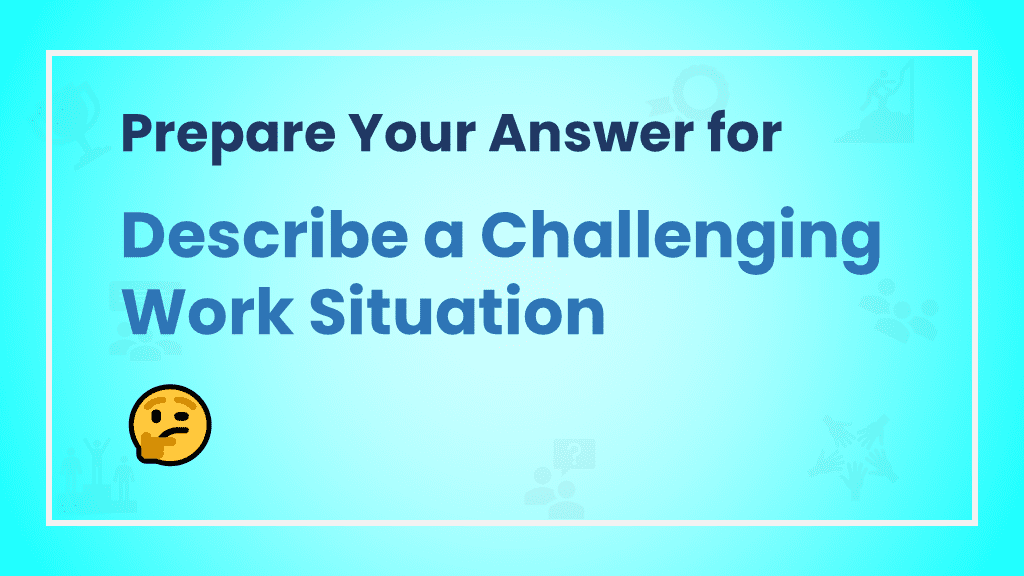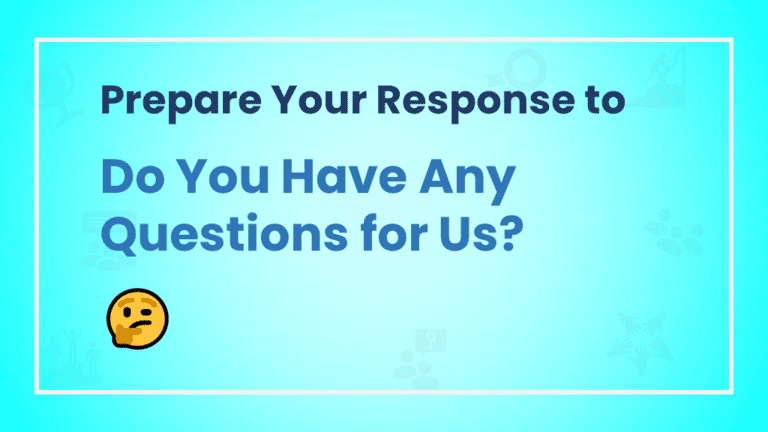Interviews are challenging and there is a good chance that you might be asked to describe a challenging work situation you've faced. 🤨 However, this question is a valuable opportunity to showcase your problem-solving skills and resilience to potential employers. 🌟 In this article, we'll guide you through the process of answering this question with confidence and poise. 💪

1. 🤷♀️ Understand the Question:
Before diving into your response, it's essential to understand what the interviewer is looking for. When they ask you to describe a challenging work situation, they want to assess your ability to handle adversity, work under pressure, and find solutions to problems. 🤯
2. ⏪ Choose the Right Example:
Select a challenging work situation from your past that is both relevant to the job you're interviewing for and demonstrates your skills and growth. Avoid discussing situations that ended negatively or ones where you were solely responsible for the challenge. 🚫
3. 🧐 Structure Your Answer:
Organize your response using the STAR method:
– Situation: Describe the context of the challenge.
– Task: Explain your specific role and responsibilities.
– Action: Detail the steps you took to address the issue.
– Result: Share the outcomes and what you learned from the experience.
4. 🗣 Articulate Your Response:
Start with a brief summary of the situation, then emphasize your role and responsibilities. Highlight the actions you took to overcome the challenge, focusing on problem-solving, collaboration, and decision-making. Conclude by discussing the positive results and any lessons learned. 🌟
5. 💡 Highlight Your Skills:
Throughout your response, emphasize the skills and qualities that are valuable to the job, such as teamwork, adaptability, leadership, or creativity. Show how you applied these skills to resolve the challenge. 🙌
6. 🎯 Stay Positive:
While discussing a challenging situation, maintain a positive tone. Avoid placing blame on others or dwelling on the negative aspects. Instead, focus on how you turned the challenge into an opportunity for growth and improvement. 🌈
7. 🤝 Teamwork Matters:
If the challenge involves working with a team, emphasize your ability to collaborate and communicate effectively. Highlight how you contributed to a positive team dynamic and achieved a collective goal. 👫
8. 🙌 Be Authentic:
Authenticity is key in interviews. Share your genuine thoughts, emotions, and experiences. Interviewers appreciate honesty and can often discern when a candidate is being insincere. 🤗
9. 🤔 Practice, Practice, Practice:
Before the interview, rehearse your response to this question with a friend, family member, or in front of a mirror. Practice will help you feel more confident and articulate during the actual interview. 🔄
Sample answers to the “Describe a challenging work situation.”
Answer 1 – Dealing with a Tight Deadline:
In my previous role as a project manager, we faced a challenging situation when a crucial team member unexpectedly had to take medical leave right before a major client presentation. This left us with an incredibly tight deadline and a significant workload gap to fill. I took charge, reallocated tasks, and worked closely with the remaining team members to ensure we met the deadline. Despite the stress, we successfully delivered the presentation, impressing the client, and I learned the importance of adaptability and teamwork in high-pressure situations.
Answer 2 – Handling a Difficult Customer:
During my time as a customer service representative, I encountered a challenging work situation when I had to deal with an irate customer who had received a faulty product. The customer was furious, and their frustration was palpable. I remained calm, actively listened to their concerns, empathized with their situation, and quickly initiated a return and replacement process. Ultimately, I not only resolved the issue but also managed to turn the customer into a satisfied, loyal advocate for our brand.
Answer 3 – Navigating Interpersonal Conflict:
In a previous job, I worked closely with a colleague who had a very different working style from mine. This led to frequent clashes and hindered our team's productivity. To address this challenge, I initiated an open and honest conversation with my colleague, seeking to understand their perspective and sharing mine. We then collaboratively developed a more effective workflow that played to both our strengths. Over time, our working relationship improved significantly, and our team became more cohesive as a result.
Answer 4 – Adapting to Technology Changes:
At my previous company, we underwent a significant technological transition, which included migrating to a new software system and implementing automation processes. Adapting to these changes was initially challenging, as it required learning new skills and workflows. I proactively sought out training, engaged with colleagues who were more tech-savvy, and gradually became proficient in the new technology. Ultimately, this experience enhanced my ability to embrace change and stay updated in a rapidly evolving industry.
Answer 5 – Leading a Struggling Team:
I once stepped into a role where I inherited a team that was demotivated and struggling to meet its performance targets. It was a considerable challenge to regain their trust and boost their morale. I organized team-building activities, provided regular feedback and support, and set clear, achievable goals. Over time, the team's performance improved, and they began to collaborate more effectively. This experience taught me the importance of leadership and motivation in achieving organizational goals.
These sample answers illustrate various challenging work situations and how the candidates effectively handled them, emphasizing their skills and lessons learned. Remember to tailor your response to your own experiences and the specific job you're interviewing for.
Answers for “Describe a challenging work situation.” in various job scenarios
1. For a Sales Position:
In my previous role as a sales representative, I faced a challenging work situation when our biggest client unexpectedly decided to terminate their contract due to budget constraints. This was a significant blow to our revenue targets for the quarter. To address this, I immediately reached out to the client to understand their concerns and explore potential solutions. After several productive discussions, we managed to renegotiate the contract, providing them with a more cost-effective package that still met their needs. This experience taught me the importance of maintaining client relationships, adaptability in sales strategies, and the ability to think creatively to retain valuable accounts.
2. For a Software Development Position:
As a software developer, I encountered a challenging work situation when a critical software module I was responsible for failed during a high-stakes client demonstration. The entire team was under pressure to fix the issue quickly. I took ownership of the problem, analyzed the code thoroughly, collaborated closely with colleagues to identify the root cause, and worked tirelessly to implement a solution. We managed to resolve the issue just in time for the demonstration, earning praise from the client for our rapid response and problem-solving skills. This experience reinforced the importance of rigorous testing and continuous improvement in software development.
3. For a Project Management Position:
During a project management role, I encountered a challenging work situation when a key vendor failed to deliver critical materials on time, jeopardizing our project's timeline and budget. To address this issue, I engaged in open and transparent communication with the vendor to understand their constraints and explore potential solutions. Simultaneously, I developed a contingency plan that involved sourcing materials from alternative suppliers and revising the project schedule. Through effective negotiation and project re-planning, we managed to keep the project on track, ensuring timely completion. This experience reinforced the significance of proactive risk management and effective vendor relationships in project management.
4. For a Healthcare Position:
In my role as a nurse, I encountered a challenging work situation when the hospital experienced a sudden surge in patient admissions during a flu outbreak. The nursing staff was overwhelmed, and we faced a shortage of critical supplies. To address this crisis, I coordinated with my team to prioritize patient care, reorganized our workflows to optimize efficiency, and worked closely with supply chain management to secure essential medical supplies. We managed to maintain the quality of care while accommodating the increased patient load, and this experience highlighted the importance of adaptability, teamwork, and crisis management in healthcare.
5. For a Marketing Position:
As a digital marketing specialist, I faced a challenging work situation when a planned social media campaign, in which we had invested significant resources, received a largely negative response from the audience. The negative feedback was impacting our brand's reputation. To address this, I quickly shifted gears and engaged with the audience to understand their concerns. We revised the campaign messaging and made it more inclusive and empathetic. Over time, we managed to turn the situation around, rebuilding trust with our audience and even gaining some positive recognition for our responsiveness. This experience emphasized the importance of agile marketing strategies, listening to the audience, and adaptability in the digital marketing landscape.
These responses demonstrate how different professionals in various job scenarios can describe challenging work situations while highlighting their skills, problem-solving abilities, and adaptability to meet the unique demands of their roles.
Conclusion:
Describing a challenging work situation in an interview can be intimidating, but with the right approach, you can turn it into a golden opportunity to showcase your abilities and personal growth. 🌟 Remember to understand the question, choose the right example, and use the STAR method to structure your response. Highlight your skills, stay positive, and be authentic. With practice, you'll ace this question and leave a lasting impression on your potential employer. 🚀 Good luck! 🍀





